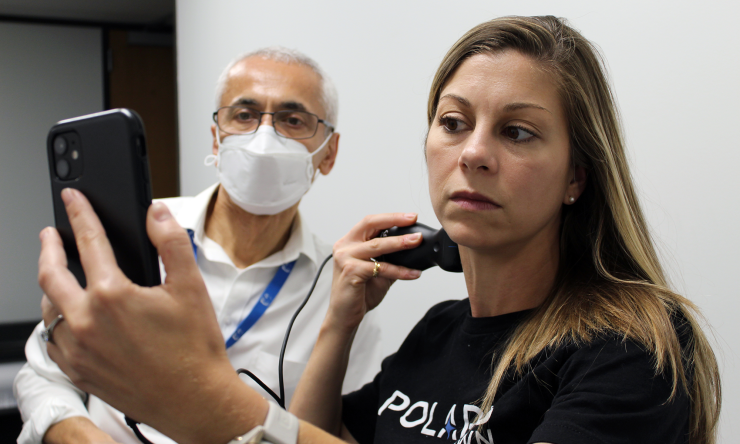TRISH sends human health experiments aboard Polaris Dawn Mission
The Translational Research Institute for Space Health (TRISH) at Baylor College of Medicine will send a series of human health research experiments aboard the upcoming Polaris Dawn mission, the first in a series of human spaceflight missions from the Polaris Program. TRISH will join other institutions to send a number of experiments into high-altitude Earth orbit.
TRISH will use federal funding from its cooperative agreement with NASA to fund a series of research experiments addressing the most pressing health risks associated with human spaceflight. The goal of the research is to advance knowledge of the effects of space travel on the health of the human body and mind, and deliver new protections and health advances to NASA as it prepares to go back to the Moon.
“The Institute’s mission is to help humans thrive in deep space,” said Dr. Dorit Donoviel, TRISH executive director and associate professor for the Center for Space Medicine at Baylor. “We are grateful to our commercial space exploration partners, and in particular, the Polaris Program, who recognize how important it is to carry out and support health research in their missions, as a route to improving health for all humans in space and on Earth.”
The spaceflight environment presents unique challenges to the body and mind, and TRISH research aims to better understand health risks and develop new countermeasures. TRISH-supported research on Polaris Dawn will include:
- Collecting data related to the vision condition Spaceflight Associated Neuro-Ocular Syndrome (SANS), which is a top risk to human health in long-duration spaceflight
- Quantifying alterations in body composition and fluid distribution during exposure to weightlessness
- Measuring cognitive performance, which reflects fitness for duty
- Collecting biometric data to track physiologic changes, which could inform on changes in overall health
- Using miniaturized, intelligent ultrasound to train the astronauts to scan themselves and deliver medical quality images
- Testing ways to predict space motion sickness to improve crew safety and in-mission performance
- Collecting data on the radiation environment to observe how space radiation may affect human systems
- Collecting biological samples for multi-omics analyses and storage in a long-term biobank to be made available to researchers in the future
The Polaris Program is an ambitious effort to rapidly advance human spaceflight capabilities while also raising funds and awareness for important causes on Earth. The program proposes three human spaceflight missions to demonstrate new technologies and conduct space health research. The first of these upcoming missions, Polaris Dawn will launch from NASA’s Kennedy Space Center in Florida. Four crewmembers will spend up to five days in orbit.
TRISH works with space companies and their diverse crews to evaluate, select and conduct rigorous and impactful health research on their missions. The research complement represents funded science projects from 10 universities and companies and builds off of the science previously supported by TRISH and accomplished on the Inspiration4 mission in 2021.
Commercial spaceflights like Polaris Dawn are increasing access to spaceflight medical and biological research opportunities. Such opportunities and access to space have been historically limited to a small group of government-trained astronauts. TRISH maintains a first-of-its-kind research platform, the EXPAND (Enhancing eXploration Platforms and Analog Definition) Program, which collects pre-, post-, and in-flight health data from multiple spaceflights and houses it in a centralized research database. Biomedical data collected from human spaceflights, like Polaris Dawn, bolsters the database, increasing scientists’ understanding of how diverse individuals respond to space travel and helping to ensure that future travelers remain healthy.
Additional details about TRISH research onboard Polaris Dawn can be found at bcm.edu/spacehealth.











